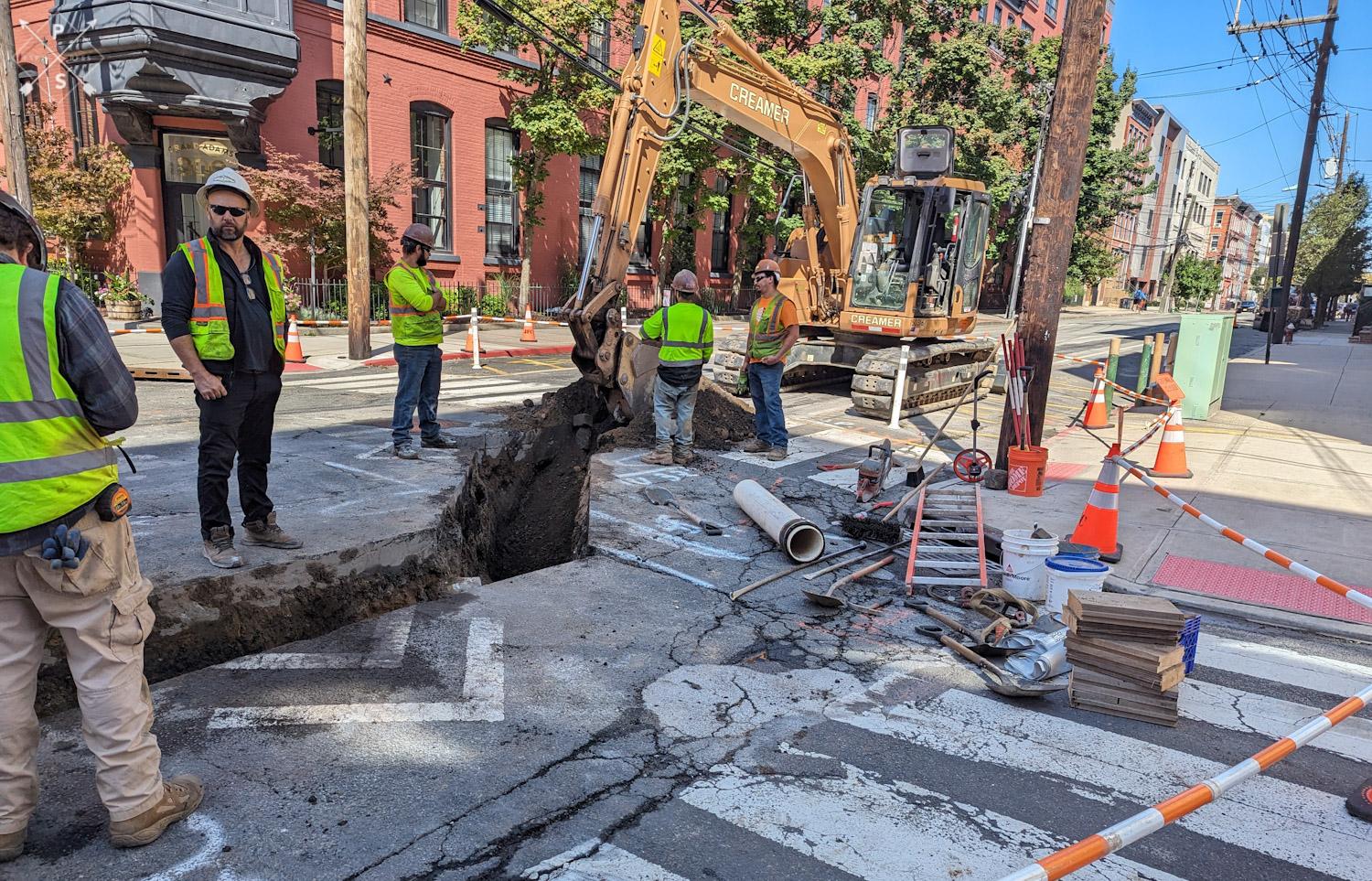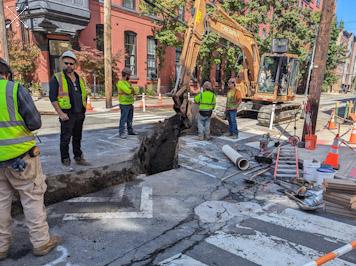Lead-Free Hoboken is a group of concerned citizens with the specific mission of working with the City of Hoboken to secure compliance with the requirements of New Jersey’s Safe Drinking Water Act and to eradicate all the lead service lines in our community

Water main replacement on Grand Street in Hoboken includes replacing any lead lines.
By Seth Abrams – Founder of Lead-Free Hoboken | September 21, 2023
Hoboken has a lead problem, and the culprits are lead service lines. Unlike water mains that carry water from the municipal water supply up and down the streets, service lines carry water from the water main to your home. These are the water lines that bring water directly to your tap and your shower. While the water mains within Hoboken do not contain lead, the same cannot be said for the service lines, which in many cases, are as old as the buildings themselves.
Issues with lead service lines are by no means specific to Hoboken. Lead service lines are primary contributors to lead contaminated drinking water nationwide. Indeed, according to a Natural Resource Defense Counsel (“NRDC”) survey, the NRDC estimates that there is a range of 9.7 million to 12.8 million pipes that are, or may be, lead, spread across all 50 States, including those States that claim to have none.
All of this begs the question: does my water contain lead? Like many communities around the nation, Hoboken utilizes corrosion control treatment (“CCT”) techniques promulgated by the EPA to inject additives into the water that reduce corrosion of the service line, thereby limiting the ability of lead from the service line to leach into our drinking water. While the implementation of CCT nationwide has resulted in major improvements in public health, it is not 100% effective in eliminating lead from drinking water. And, because there is no safe level of lead exposure, especially for children(1), the only way to guarantee safe water is by replacing all the lead service lines in our community.
In recognition of the foregoing, in July 2021, Governor Murphy signed into law P.L.2021, Ch.183 (the “Act”), which requires community water systems in New Jersey to identify all lead service lines, provide public notification regarding the presence of all lead service lines, and replace them by 2031. Per the Act, the lead service line inventories were to be posted on the websites of water systems by January 2022. The Act also requires community water systems to notify residents who have lead service lines, all with the goal of eradicating them.
In essence, the Act imposes two mandates on public water systems, such as Hoboken’s, which contracts with a private company, Veolia, to operate its municipally-owned water system. First, the Act requires a water system to conduct a full and complete inventory of all lead service lines within its system. According to the Act, as of July 2022, water systems were required to create and submit to the New Jersey Department of Environmental Protection a comprehensive inventory that utilizes “every reasonable method available to locate all Lead service lines within its service area.” For every line determined to contain lead, the inventory must provide “supporting information detailing the reasons why each such service line is believed to contain Lead.” “For each service line identified as being of unknown composition, a description must detail the steps undertaken to determine whether the line contains Lead.”
The Act further requires that the water system update the inventory annually, notify impacted citizens, and create a plan of action to replace 10% of lead-identified lines per year with full system-wide replacement occurring on or before July 2031. For government-owned community water systems, like Hoboken’s, any costs incurred for assessment and replacement of lead lines, excluding any portion funded by grants or other subsidies, may be borne by all of the customers of the water system OR may be assessed to a property of a property owner. Notably, regardless of the party responsible for shouldering the ultimate cost of replacement, the Act puts the responsibility on the City of Hoboken to ensure that all lead service lines are replaced.
Unfortunately, and despite the very real health impacts of inaction on its citizens, Hoboken has failed to take any effective steps above the minimum to comply with its obligations under the Act, including conducting a comprehensive inventory of service lines, providing notice to impacted citizens, and, most importantly, the creation of a viable plan for the replacement of impacted service lines. Indeed, in its July 2022 survey, 2,881, out of Hoboken’s 4,323 service lines, were identified as “lead status unknown” with only 99 sites being positively identified as lead. Importantly, there is little doubt that a significant number of the lines identified as “lead status unknown” are, in fact, service lines comprised of lead.
Critically, because Hoboken’s inventory failed to undertake the necessary investigation to determine the makeup of service lines, even where a determination was easy to make, more than half of Hoboken’s citizens are in the dark with respect to the makeup of their service lines. As a direct result, not only are there no plans in place for the replacement of the impacted lines (as they have yet to be identified), citizens with lead service lines have not been provided with proper notice and therefore do not know that they should be taking remedial action, including use of water filtration capable of eliminating lead (a Brita pitcher is not sufficient). Further, while Hoboken was required to create an updated inventory as of July 2023, it has not updated its website with a new inventory or otherwise responded to requests for a copy of the updated inventory so one can determine whether they are actively investigating where the lead lines are located.
Lead-Free Hoboken is a group of concerned citizens with the specific mission of working with the City of Hoboken to secure compliance with the requirements of the Act and to eradicate all the lead service lines in our community. Whether through water testing initiatives, or help with securing grants for service line replacements, Lead-Free Hoboken wants to be a partner for the betterment of our community and the health of our fellow citizens. While replacement of all impacted service lines in Hoboken is no doubt a daunting task, it is a necessary public health initiative for our community.
If you would like to work with Lead-Free Hoboken or learn more about lead service lines, please contact us at leadfreehoboken@gmail.com. We would love to hear from you.
(1) Lead is a potent neurotoxin that can cause irreversible harm. The EPA notes that low levels of exposure in children are linked to damage to the brain and nervous system, learning disabilities, shorter stature, impaired hearing, and harm to blood cells. Exposed adults can suffer from cardiovascular disease and adverse impacts on reproduction and the kidneys, among other harmful health effects. See US EPA Lead and Copper Rule Revisions White Paper, October 2016.


